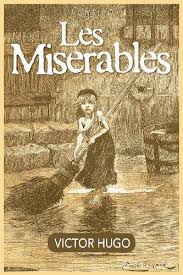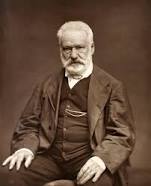Les Misérables Page #3
Les Misérables is a French historical novel by Victor Hugo, first published in 1862, that is considered one of the greatest novels of the 19th century. In the English-speaking world, the novel is usually referred to by its original French title.
"Expenses of carriage? What can be done with it in a town of less than four thousand inhabitants? Expenses of journeys? What is the use of these trips, in the first place? Next, how can the posting be accomplished in these mountainous parts? There are no roads. No one travels otherwise than on horseback. Even the bridge between Durance and Château-Arnoux can barely support ox-teams. These priests are all thus, greedy and avaricious. This man played the good priest when he first came. Now he does like the rest; he must have a carriage and a posting-chaise, he must have luxuries, like the bishops of the olden days. Oh, all this priesthood! Things will not go well, M. le Comte, until the Emperor has freed us from these black-capped rascals. Down with the Pope! [Matters were getting embroiled with Rome.] For my part, I am for Cæsar alone." Etc., etc. On the other hand, this affair afforded great delight to Madame Magloire. "Good," said she to Mademoiselle Baptistine; "Monseigneur began with other people, but he has had to wind up with himself, after all. He has regulated all his charities. Now here are three thousand francs for us! At last!" That same evening the Bishop wrote out and handed to his sister a memorandum conceived in the following terms:-- EXPENSES OF CARRIAGE AND CIRCUIT. For furnishing meat soup to the patients in the hospital. 1,500 livres For the maternity charitable society of Aix . . . . . . . 250 " For the maternity charitable society of Draguignan . . . 250 " For foundlings . . . . . . . . . . . . . . . . . . . . . 500 " For orphans . . . . . . . . . . . . . . . . . . . . . . 500 " ----- Total . . . . . . . . . . . . . . . . . . . . . . . 3,000 " Such was M. Myriel's budget. As for the chance episcopal perquisites, the fees for marriage bans, dispensations, private baptisms, sermons, benedictions, of churches or chapels, marriages, etc., the Bishop levied them on the wealthy with all the more asperity, since he bestowed them on the needy. After a time, offerings of money flowed in. Those who had and those who lacked knocked at M. Myriel's door,--the latter in search of the alms which the former came to deposit. In less than a year the Bishop had become the treasurer of all benevolence and the cashier of all those in distress. Considerable sums of money passed through his hands, but nothing could induce him to make any change whatever in his mode of life, or add anything superfluous to his bare necessities. Far from it. As there is always more wretchedness below than there is brotherhood above, all was given away, so to speak, before it was received. It was like water on dry soil; no matter how much money he received, he never had any. Then he stripped himself. The usage being that bishops shall announce their baptismal names at the head of their charges and their pastoral letters, the poor people of the country-side had selected, with a sort of affectionate instinct, among the names and prenomens of their bishop, that which had a meaning for them; and they never called him anything except Monseigneur Bienvenu [Welcome]. We will follow their example, and will also call him thus when we have occasion to name him. Moreover, this appellation pleased him. "I like that name," said he. "Bienvenu makes up for the Monseigneur." We do not claim that the portrait herewith presented is probable; we confine ourselves to stating that it resembles the original. CHAPTER III--A HARD BISHOPRIC FOR A GOOD BISHOP The Bishop did not omit his pastoral visits because he had converted his carriage into alms. The diocese of D---- is a fatiguing one. There are very few plains and a great many mountains; hardly any roads, as we have just seen; thirty-two curacies, forty-one vicarships, and two hundred and eighty-five auxiliary chapels. To visit all these is quite a task. The Bishop managed to do it. He went on foot when it was in the neighborhood, in a tilted spring-cart when it was on the plain, and on a donkey in the mountains. The two old women accompanied him. When the trip was too hard for them, he went alone. One day he arrived at Senez, which is an ancient episcopal city. He was mounted on an ass. His purse, which was very dry at that moment, did not permit him any other equipage. The mayor of the town came to receive him at the gate of the town, and watched him dismount from his ass, with scandalized eyes. Some of the citizens were laughing around him. "Monsieur the Mayor," said the Bishop, "and Messieurs Citizens, I perceive that I shock you. You think it very arrogant in a poor priest to ride an animal which was used by Jesus Christ. I have done so from necessity, I assure you, and not from vanity." In the course of these trips he was kind and indulgent, and talked rather than preached. He never went far in search of his arguments and his examples. He quoted to the inhabitants of one district the example of a neighboring district. In the cantons where they were harsh to the poor, he said: "Look at the people of Briançon! They have conferred on the poor, on widows and orphans, the right to have their meadows mown three days in advance of every one else. They rebuild their houses for them gratuitously when they are ruined. Therefore it is a country which is blessed by God. For a whole century, there has not been a single murderer among them." In villages which were greedy for profit and harvest, he said: "Look at the people of Embrun! If, at the harvest season, the father of a family has his son away on service in the army, and his daughters at service in the town, and if he is ill and incapacitated, the curé recommends him to the prayers of the congregation; and on Sunday, after the mass, all the inhabitants of the village--men, women, and children--go to the poor man's field and do his harvesting for him, and carry his straw and his grain to his granary." To families divided by questions of money and inheritance he said: "Look at the mountaineers of Devolny, a country so wild that the nightingale is not heard there once in fifty years. Well, when the father of a family dies, the boys go off to seek their fortunes, leaving the property to the girls, so that they may find husbands." To the cantons which had a taste for lawsuits, and where the farmers ruined themselves in stamped paper, he said: "Look at those good peasants in the valley of Queyras! There are three thousand souls of them. Mon Dieu! it is like a little republic. Neither judge nor bailiff is known there. The mayor does everything. He allots the imposts, taxes each person conscientiously, judges quarrels for nothing, divides inheritances without charge, pronounces sentences gratuitously; and he is obeyed, because he is a just man among simple men." To villages where he found no schoolmaster, he quoted once more the people of Queyras: "Do you know how they manage?" he said. "Since a little country of a dozen or fifteen hearths cannot always support a teacher, they have schoolmasters who are paid by the whole valley, who make the round of the villages, spending a week in this one, ten days in that, and instruct them. These teachers go to the fairs. I have seen them there. They are to be recognized by the quill pens which they wear in the cord of their hat. Those who teach reading only have one pen; those who teach reading and reckoning have two pens; those who teach reading, reckoning, and Latin have three pens. But what a disgrace to be ignorant! Do like the people of Queyras!"
Translation
Translate and read this book in other languages:
Select another language:
- - Select -
- 简体中文 (Chinese - Simplified)
- 繁體中文 (Chinese - Traditional)
- Español (Spanish)
- Esperanto (Esperanto)
- 日本語 (Japanese)
- Português (Portuguese)
- Deutsch (German)
- العربية (Arabic)
- Français (French)
- Русский (Russian)
- ಕನ್ನಡ (Kannada)
- 한국어 (Korean)
- עברית (Hebrew)
- Gaeilge (Irish)
- Українська (Ukrainian)
- اردو (Urdu)
- Magyar (Hungarian)
- मानक हिन्दी (Hindi)
- Indonesia (Indonesian)
- Italiano (Italian)
- தமிழ் (Tamil)
- Türkçe (Turkish)
- తెలుగు (Telugu)
- ภาษาไทย (Thai)
- Tiếng Việt (Vietnamese)
- Čeština (Czech)
- Polski (Polish)
- Bahasa Indonesia (Indonesian)
- Românește (Romanian)
- Nederlands (Dutch)
- Ελληνικά (Greek)
- Latinum (Latin)
- Svenska (Swedish)
- Dansk (Danish)
- Suomi (Finnish)
- فارسی (Persian)
- ייִדיש (Yiddish)
- հայերեն (Armenian)
- Norsk (Norwegian)
- English (English)
Citation
Use the citation below to add this book to your bibliography:
Style:MLAChicagoAPA
"Les Misérables Books." Literature.com. STANDS4 LLC, 2025. Web. 12 Mar. 2025. <https://www.literature.com/book/les_misrables_13>.








Discuss this Les Misérables book with the community:
Report Comment
We're doing our best to make sure our content is useful, accurate and safe.
If by any chance you spot an inappropriate comment while navigating through our website please use this form to let us know, and we'll take care of it shortly.
Attachment
You need to be logged in to favorite.
Log In